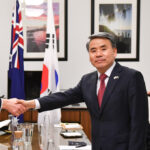In an ambitious bid to transform its economic landscape, Malaysia is looking to vault into the top 30 largest global economies in under a decade, surging from its 37th position in 2022 as per the World Bank. This bold objective is predicated on enhancing regional integration and competitiveness, prioritising economic intricacy, and propelling towards higher value production chains.
Prime Minister and Finance Minister, Datuk Seri Anwar Ibrahim, envisions an economic makeover that places Malaysia at the forefront of Asia’s economic powerhouses. He advocates for a growth mindset that transcends complacency with the existing growth rates of 4-5%. “Through concerted effort and comprehensive reforms, the growth of 5.5% is achievable, and I foresee a potential for a 6% growth rate,” he asserted during the Madani Economy initiative launch aimed at empowering the populace.
To meet this ambitious target, Anwar believes Malaysia must embrace a more intense level of economic integration with its regional peers, particularly amid global supply chain disruptions. This would entail fostering highly competitive indigenous corporations capable of carving a niche in the ASEAN market.
Anwar accentuated that governmental initiatives should extend beyond mere free trade agreements. The potent combination of strategic trade diplomacy, bilateral and multilateral market integration, and seamless movement of goods, capital, human resources, and technology sharing could strengthen ties with neighbouring countries.
Besides envisaging Malaysia as a top 30 economy, the Madani Economy blueprint also sets six mid-term benchmarks for the next decade. These include featuring among the top 12 in the Global Competitiveness Index, achieving 45% employee compensation of the GDP, escalating women’s workforce participation to 60%, securing a spot among the top 25 in the United Nations Human Development Index and Corruption Perception Index, and ensuring fiscal stability with a maximum 3% fiscal deficit.
Tax incentives pegged to achievements are on the anvil to spur companies focused on high-impact activities. Anwar voiced, “Through necessary reforms, we aspire for Malaysia to be recognized among the world’s top 12 economies in terms of competitiveness and ease of doing business.”
On the investment front, companies such as Sumitomo Corporation, Tesla, Rongsheng, and Samsung Engineering have pledged their commitment. The Prime Minister emphasized that efforts to attract more companies to choose Malaysia as their investment hub must be redoubled.
Anwar highlighted the need for the globalisation of local start-ups and small and medium enterprises. He stressed that Government-linked companies (GLCs) and government investment-linked companies (GLICs) must spearhead domestic direct investment and bolster local vendor development in key sectors such as electronics, the digital economy, and aerospace.
Also read: Australia Swings Towards South Korea: A $7 Billion Military Contract Over Germany
The government, in collaboration with GLICs, plans to inject an additional RM1 billion to match with private funds to boost start-ups and nurture technopreneurs. A further RM100 million will be allocated for matching grants for digitalisation, accelerating the transition of micro, small, and medium enterprises to a digital business model. An extra RM400 million will be dedicated to micro-loans under various agencies, including SME Corporation, Tekun, Mara, and Teraju.
Concluding his address, the Prime Minister elucidated the government’s short-term priority to restore the country’s fiscal prowess. Although the tax-to-GDP ratio currently sits at a regional low of 12%, Anwar reassured that necessary fiscal reforms would not neglect the people’s cost-of-living concerns and continue to extend aid to those in need.
Source: This article is based on information from Malay Mail.
















